Chris Baty's Blog, page 191
April 9, 2014
Ask An Author: "How do you create realistic-feeling characters?"
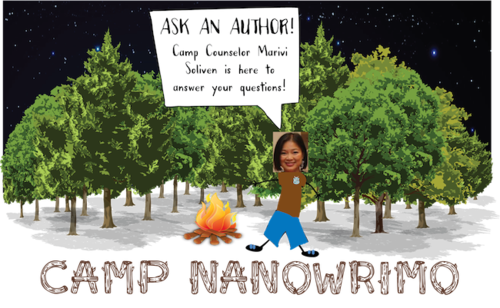
Each week, a new author will serve as your Camp Counselor, answering your writing questions. Marivi Soliven, our second counselor, has taught writing workshops at the University of California, San Diego and at the University of the Philippines. Her most recent novel, The Mango Bride , is about two Filipina women, and the unexpected collision that reveals a life changing secret.
How do you create realistic-feeling characters? — Jennifer M.
I watch people all the time for odd mannerisms and unique gestures. I file those away in memory until a likely character comes along who can use it. Following the same logic, I sometimes imagine an actor playing the characters in my novel. Many of the female protagonists were drawn from images of my mother and her sisters in the ‘60s, with their Jackie Kennedy bouffants, shift dresses and chain-smoking, hard-drinking ways.
Anytime I couldn’t move forward in a scene I would ask, “Well, what would the actor do? How would my mom respond to that argument?”
Revealing physical details via physical gestures or through the eyes of another character also helps make a character more three-dimensional. In one scene, my character Lydell scratches his hairy nape; when he grins at Beverly she notices that his teeth are the color of weak tea.
Use all your senses in the description of your characters, too. Señora Concha is a chain smoker who loves exported perfume so she’s described as smelling like a smokestack in the Garden of Eden. When Beverly first touches Josiah’s forearm, she marvels at the amount of hair covering his freckled skin.
Finally, add some softness or vulnerability to your villains because that makes them more like folks you come across in real life. In The Mango Bride, Josiah is cruel to his wife, but he is exceptionally tender around their young daughter. When you think of your characters as actual people you know and can converse with rather than images in your head, they really do come alive in the story.
Next week’s Camp Counselor will be the great Patricia Wrede, author of fantasy novels such as the The Enchanted Forest Chronicles.
April 8, 2014
"I’m not going to tell you how I write a plot because everyone does it differently, and your..."
But I will say something about the ending of a novel. I find that very often, at the ending of a novel, the writer (me, or you) will use a verb like ‘realized’, or ‘understood’, or ‘knew’, or ‘found’. It’s the job of the protagonist to accomplish all of those things.
And it’s the job of the writer to show the reader how it happened, by choosing just the right words.”
- Lois Lowry, on writing towards an ending.
April 7, 2014
Ask An Author: "Could you share your query letter that caught your literary agent's attention? And any other query pointers/tips, do’s or don'ts?"
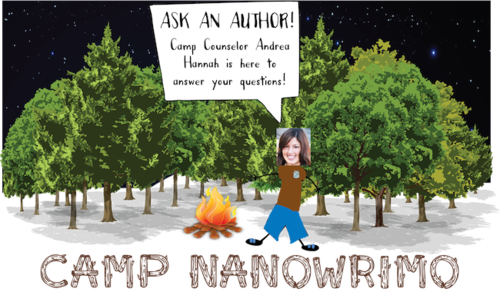
Each week, a new author will serve as your Camp Counselor, answering your writing questions. Andrea Hannah lives in the Midwest, where there are plenty of dark nights and creepy cornfields to use as fodder for her next thriller. Her debut YA novel, Of Scars and Stardust, will be published in the fall.
Could you share your query letter that caught your literary agent’s attention? And any other query pointers/tips, do’s or don’ts? — Anonymous
I’ve written quite a bit about my query, so the whole letter and the story that goes with it on the blog I share with several other YA authors, The Secret Life of Writers. You can check that out here.
My biggest query tip is to research, research, research. When you send out a bunch of query letters to people who may be kind of “meh” about your style of writing, there’s a greater chance that if one of those queries does stick, and an agent decides to take you on as a client, they may only like the book you’ve queried them with. I encourage you to dream bigger than that. What about your next book, or the book after that? What do you want for the span of your writing career?
One of the best things you can do for yourself is to really dig deep and do a thorough search of the agents you’re particularly interested in. What are their likes? What do they tweet about? Are they on Instagram? If so, what are they taking pictures of? It sounds a little stalker-ish, but research needs to be your BFF.
I knew my agent Victoria and I would get along wonderfully when I saw her tweet about Coraline, one of my favorite books ever. I also saw her tweet about various things she likes to read about and manuscripts she’d love to represent: stories about computer hackers, criminals, disappearances, and phobias. I also love all of these things and have written about many of them, so I trusted that she’d be into my next book, too (and she was!).
Our next Camp Counselor will be Marivi Soliven, author of literary fiction novel The Mango Bride .
April 4, 2014
Ask An Author: "Do you ever feel like you're too close to your material to edit it properly?"

Each week, a new author will serve as your Camp Counselor, answering your writing questions. Andrea Hannah, our first counselor, lives in the Midwest, where there are plenty of dark nights and creepy cornfields to use as fodder for her next thriller. Her debut YA novel, Of Scars and Stardust, will be published in the fall.
Do you ever feel like you’re too close to your material to edit it properly? Maybe like you’ve been reading it and thinking about it too long to realize if something’s off? If so, how do you deal with that? — peetapearl
Late in 2012, I drafted the first novel in a sci-fi thriller trilogy. Then I spent every single moment of 2013 working on that book, rewriting that book, and putting that draft through the wringer after a copious amount of feedback from my critique partners and beta readers. After each draft, I was certain it was ready. I’d send it to my agent, and it was not ready. Every. Single. Time.
Here’s what I know now: Time and space are your two best friends as a writer. After I put two months time between that book and me, and started drafting and thinking about something else entirely, I went back and re-read it. And that’s when I could look at it with fresh eyes, and be honest with myself about what needed to be changed. It was only then that I could begin to fix what had been broken all along, and get some perspective from new beta readers.
If you’re struggling with revising your draft, my very best suggestion is to walk away from it. No, run. Get as far away as you can from it. Start a love affair with a new piece during Camp NaNoWriMo, or take a break from writing all together and live; go to movies, visit friends, go bungee jumping, whatever. I promise, it’ll be waiting for you when you come back, and this time you’ll be ready.
Next week’s Camp Counselor will be Marivi Soliven, author of literary fiction novel The Mango Bride .
April 3, 2014
Writer Fuel: Of Pasta, Gifs, and a Balanced Writer's Life

Every writer needs a little writer fuel, whether it’s fueling your body, or your mind. Every week, staffers at Camp NaNoWriMo HQ will be telling you about the food and the music that inspires them. Today, our program director Chris Angotti shares the secret to a balanced internet diet:
There’s a song by this band Dogbreth. It’s called “Appetite for Distraction” and it starts like this:
Like how it’s harder to work on what I need / To work on
When there’s internet / When there’s internet in my room
The vocalist, Tristan Jemsek, plaintively sings the intro over a simple guitar lead. His hanging lyrical phrase (“To work on”) and false start to the second line suggest an uncertain narrator, and “in my room” implies insularity—a bunch of potential backstory in a small amount of time.
But I want to focus on what he’s saying, and how I’ll bet every single person reading this can relate:
It is really, really freaking difficult to get anything productive done when there’s this wide world of temporarily amazing stuff available at a swipe.
There are dogs! And babies! And dogs with babies! There are a million Girls thinkpieces. There are constant casting reveals of the latest YA movie adaptation. There are potential outrages around every corner, and an infinite number of conversations to join in on. And that’s before you even find out which pop star should be your best friend.
You know this, and I’m sure you’ve fallen prey to the time-suck of, like, “Get Lucky” lipdub videos. We all have.
The next lines of “Appetite for Distraction”:
Or how it’s harder to cook a wholesome meal / For myself
When there’s pasta / When there’s pasta in the cupboard
So, the narrator is equating easy, empty internet time with the fall-back simplicity of a big pot of pasta—something that won’t be taxing, but is of little nutritional value on its own.
Here’s the thing: the internet, like pasta, can be part of a balanced diet.
You’re here because you are a creative person with stories to tell. When you sit down at your computer, writing should always be your primary purpose. Spend as much time as you can doing it, whether it’s by disabling your Wi-Fi, installing Freedom, or practicing old-fashioned self-control.
But occasionally, you gotta see some dogs hanging out with some babies. And sometimes, there’s nothing better than a whole mess of pasta. It’s all a matter of proportion, figuring out how to make your internet time and your noodles as nourishing as possible.
Don’t be ashamed to go down a rabbit hole of Frasier GIFs, as long as you always return to what you need to work on.
And cook that pasta, but make it a wholesome meal—like these recipes for Whole-Wheat Rigatoni with Roasted Vegetables; Whole-Wheat Pasta with Edamame, Arugula, and Herbs; and Kale and Sun-Dried Tomato Whole-Wheat Spaghetti.
Now, if you’ll excuse me, my BFF Shakira and I are headed to the kitchen.
‒ Chris
Photo by Flickr user Christian Cable.
April 2, 2014
Ask An Author: "How would one write a love triangle without turning it into a major cliché?"

Each week, a new author will serve as your Camp Counselor, answering your writing questions. Andrea Hannah, our first counselor, lives in the Midwest, where there are plenty of dark nights and creepy cornfields to use as fodder for her next thriller. Her debut YA novel, Of Scars and Stardust, will be published in the fall.
How would one write a love triangle without turning it into a major cliché? — Anonymous
There’s a reason why love triangles are a trope in YA fiction. Let’s be honest: how many of you dated someone in high school but still had a crush on someone else? Or dated one guy and watched him drift out of the picture, only to have him drift back in once you moved on to someone else? Creating situations that are realistic and less obvious is the key to a love triangle that doesn’t feel cliché.
Write well-developed, multi-dimensional characters and a protagonist that has a different relationship with each, and you’re on your way to an interesting triangle. Just keep it realistic.
(Two of my favorite love triangles are Mat, Anna, and the boy she dates over the summer in Twenty Boy Summer by Sarah Ockler, and Adam, Blue, and Gansey in Maggie Stiefvater’s The Raven Cycle series.)
Next week’s Camp Counselor will be Marivi Soliven, author of literary fiction novel The Mango Bride .
April 1, 2014
"Every writer uses different tools to write books, and none of those tools are right for every..."
Outlines, character dossiers, three-act format and other plotting formulas—these are all tools. Sometimes they’ll work, sometimes they won’t. Nobody can tell you if any specific one will help you on a given project. Only through practice and experience can you get a sense of what works for you as a writer.”
- Brandon Sanderson, on “the right way to write”.
March 31, 2014
Camp NaNoWriMo, April 2014: Your Map to the Month Ahead
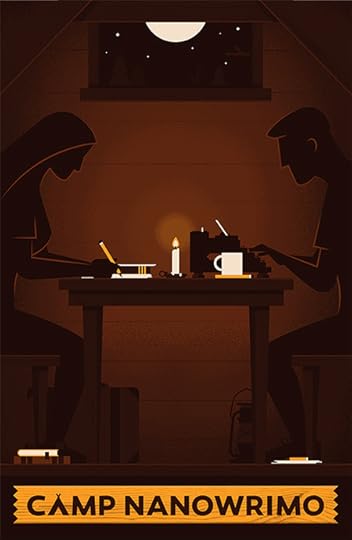
At midnight on April 1, you’ll set out on a month-long hike. No, not along the Appalachian Trail or the Great Wall of China or anything pedestrian like that. This trek traverses more glorious territory: your unique, creative brain.
So strap your pen, laptop, or typewriter to your back and let’s get moving. (We’re jealous of you hand-writers in this metaphor.) This email serves as an easily stowed guide to what we’ve got planned during your journey.
Before You Go
Keep an eye on the blog here, and check out the Writing Resources page, to stock up on inspiration. We’ll keep posting helpful advice—especially from our wise Camp Counselors—throughout April.
Consider giving a little back to Camp. Think of it like those honor-system donation boxes at trailheads, except giving here also nets you some great goodies and the knowledge that you’re contributing to essential creativity around the world. You can also get sponsored by family and friends to share the NaNo love.
Grab a T-shirt or mug. Bonus: The shirt can double as an emergency flag if you get lost among your neural pathways.
Week One
On Wednesday at 11:00 a.m. PST, tune in for the first Campfire Hangout of the year. You want writing prompts? Oh man, have we got writing prompts. We’ll be back every Wednesday with a new Virtual Write-In.
On Thursday, check your Camper Messages for a pep talk from a writer just like you. We’ll send one every week.
And every day, look for challenges from @NaNoWordSprints and conversations in the NaNoWriMo forums.
Week Two
On Saturday, April 12, join us for the April NaNoWriMo Writing Marathon! We’ll spend all day livestreaming and encouraging your Camp progress. To participate, just follow along (via our YouTube channel or with #NaNoThon) and plan to make a pledge for the time you spend writing with us.
Week Three
You know what we always say this week, right? Back up your project! It’s precious cargo.
Also, looking for some midway meal rewards? The Writer Fuel series will be in full, delicious effect.
Week Four
You can win—by reaching your goal and validating your word count—from Friday, April 25 through Wednesday, April 30. (If you’re planning to work up until the last minute, be sure your time zone is set correctly.)
To make it official, just click “Validate your word count to win” under the tent on the homepage and follow the directions from there. You’ll receive a selection of winner goodies a few days later; check out our sponsor offers for a preview (plus a few all-Camper discounts).
And as always, we’ll be rooting for you every single day of your expedition, in conditions good and bad. Because you’re a writer, and we believe in you.
Regretting the choice of stone slab as writing accessory,
Chris Angotti
Director of Programs
March 28, 2014
Everything We Know About...Editing!
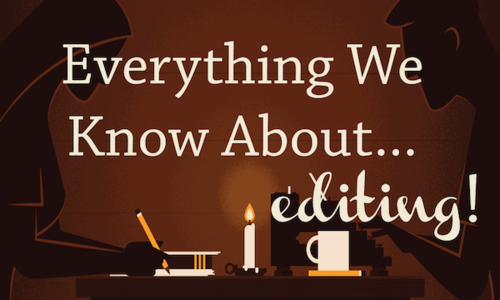
Are you tackling a writing project that isn’t a brand-spanking new novel during Camp NaNoWriMo? Good news! We’re compiling lists of everything we know about nonfiction, editing, and scripts. We revisit editing while it’s fresh in our minds from the “Now What?” Months below:
You get to the part of the novel where you think to yourself, “what now? How can I make it even better?” Well, that’s a sign for the best part to happen—the editing and revision process! Here are resources that can help you edit those inconsistent story lines and cut out those awkward scenes.
The Joys of Editing
Why Editing Matters… Even If You Never Share Your Novel
Time to Revise, But How Will I Know If I’m Making It Better, Not Worse?
On Rewriting & Growing Up
Revision & Slipping Back Into Your World
Deductive Editing: Revising Like a Master Detective
The Steps to Editing and Revision
A 7-Step Guide to Big Picture Revision (With Bonus Checklists!)
Revising Your Novel: The Good, the Bad, and the Ugly
The Big Bad Guide to Novel Revision
Beginning the Awesome Journey of Revision
Four Types of Book Editing
On Building Better Stories and Perseverance
Reveling with Your Inner Editor on the Revision Playground
In Your Words: Revision Advice from Young Writers
Why You Should Throw a Wrench In Your Editing Routine
Keep These In Mind When You Edit
The 6 Commandments of Starting the Editing Process
Tips from Revisionland
Be Kind to Yourself While You Edit
3 Ways to Let Your Writing Fly
What Should You Keep In Mind Before You Begin The Revision Process?
What to Keep When Editing Requires a Reset
Revision and Reading Aloud
As long as you have these resources, you’re well on your way to building an awesome book.
— Wendy
March 27, 2014
Everything We Know About...Scripts!
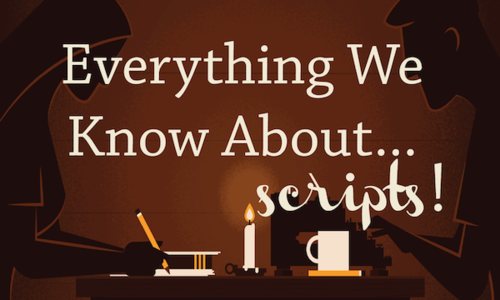
Are you tackling a writing project that isn’t a brand-spanking new novel during Camp NaNoWriMo? Good news! We’re compiling lists of everything we know about nonfiction, editing, and scripts. Check our cleverly scripted list of script resources below:
INT. CABIN - AFTERNOON
A couple of campers hunch over their laptops, frustration etched on their faces. They type out a sentence, but deletes it soon after. The process repeats itself. The campers groan, scratching the tops of their heads. They open up the NANOWRIMO BLOG, looking for resources to get their script started or to get them out of their script-writing rut.
Introduction to Scripts:
The Script Cabins: Writing a Feature Screenplay 101
The Script Cabins: Writing for TV 101
The Script Cabins: Writing a Play 101
How to start your script:
Five Ways to Start a Script
What Script-Writers Can Learn from Improv
What Script-Writers Can Learn from Improv (Part Two!)
Writing Action and Description
Creating Character: Don’t Be Boring
Five Questions to Help Pilots Take Flight
Script Tips!
Five Screenwriting Pitfalls to Avoid
How to format and structure your script:
How to Format a Screenplay
How to Format a TV Script
How to Format A Stage Play
Screenplay Structure: Three Acts & Five Points
One-camera vs. Three-camera (and everything in between): The Five New TV Formats
Are you stuck? No worries!
Five Building Blocks for a Rich Scene
12 Things to Keep in Mind When Writing an Ending
Thinking Outside the Plot: The Set Piece
Novels vs Script: The Big Debate
Now you are on your way to crafting a great script. Good luck!
— Wendy
Chris Baty's Blog
- Chris Baty's profile
- 63 followers



